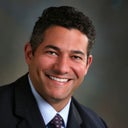Hello Believer, thank you for your question regarding breathing difficulties after a tummy tuck.








